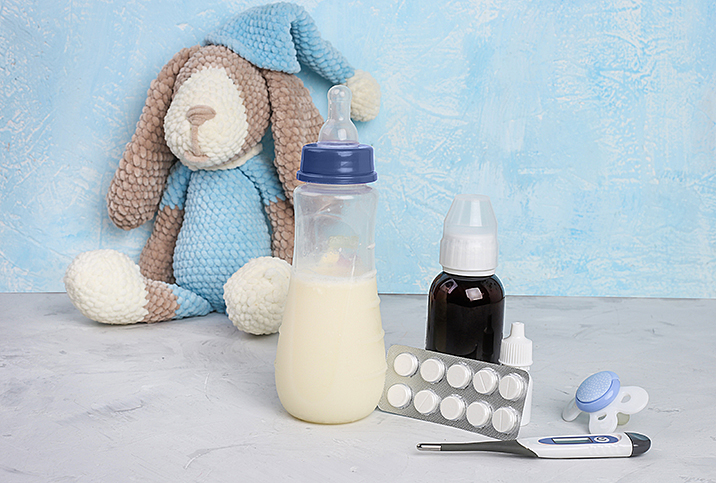Women Are Taking Mucinex to Get Pregnant—But Does It Work?

TikTok is the home of trends and hacks, from tips on how to use your beauty products correctly to dubious advice on the benefits of putting ice in your vagina. A new idea circulating on the platform is that using Mucinex D, a common cold and flu medication, can help you conceive naturally.
The trend began when user @julia_schuller posted a video explaining how she was taking Mucinex D to treat her COVID-19 symptoms and realized that it helps with other aspects, as well.
"It helps you get pregnant," she whispered into the camera.
Schuller, who has polycystic ovary syndrome (PCOS) and endometriosis, further explained that she had been tracking her fertile signs. While on the cold medication, she noticed she was much more fertile than normal. When she asked her doctor what was happening, her doctor told her, "We actually give Mucinex to women to help increase their fertility."
She doubts regular use of Mucinex causes any adverse effects, [but] a fertility specialist could better determine your odds of getting pregnant and help you develop a path toward conception.
Not surprisingly, this video has received 1.2 million likes and more than 14,000 comments, with many people interested in trying it for themselves. Many users have shared their experience of trying Mucinex D to get pregnant, with some being successful and others declaring that it didn't work for them.
Can Mucinex D really increase your chances of getting pregnant? Here's what we found out from fertility experts.
What is Mucinex D made of?
Mucinex D is an expectorant and decongestant. This over-the-counter drug contains guaifenesin and pseudoephedrine, which work together to loosen mucus in the chest and reduce nasal congestion. It's often suggested to patients as a treatment for the common cold, cough and allergies.
This medication is meant to be ingested orally, with or without food, every 12 hours. You are advised to drink lots of water during this time to help thin out your sinus mucus and prevent side effects. People taking prescription monoamine oxidase inhibitor (MAOI) or with health conditions, including thyroid disease, high blood pressure and diabetes, shouldn't take Mucinex D without speaking to their doctor.
Is there a connection between Mucinex D and fertility?
"A small study in 1982 suggested that the active ingredient in Mucinex [guaifenesin] helps to thin the cervical mucus during ovulation, which can help couples conceive," explained Lauren Demosthenes, M.D., an OB-GYN in South Carolina and senior medical director for the pregnancy app Babyscripts.
In the study, 40 couples had conception issues for a minimum of 10 months and hostile mucus. Cervical mucus plays an important role in conception. Some women have an abundance of mucus at the opening to their cervix. When it's too thick, it can block the cervical canal and prevent sperm from entering.
The women in the study took 200mg of guaifenesin by mouth three times a day, beginning on day five of her menstrual cycle and ending when her basal body temperature showed a slight increase. That increase signaled ovulation.
During ovulation, the consistency of cervical mucus changes and becomes wetter and more slippery, which helps sperm move more freely toward the uterus. The theory behind Mucinex increasing fertility is that it thins out the cervical mucus, allowing the sperm to travel more easily to reach an egg.
Fifteen pregnancies occurred out of the 23 couples who displayed an improvement in cervical mucus quality. Eighty percent of women in the study with hostile mucus as the sole source of their infertility became pregnant within 2.4 months.
Does Mucinex really work, though?
Since the release of the 1982 study, there have been no further studies to support the theory that Mucinex makes it easier to get pregnant. As such, most healthcare professionals reject the off-label use of Mucinex, or usage not approved by the Food and Drug Administration (FDA), as a suitable treatment for women who want to get pregnant.
Gareth Nye, Ph.D., program leader for BMedSci Medical Science at the University of Chester in England with expertise in the physiology of pregnancy, does not believe there is a link between Mucinex and fertility.
"The aim of cough medicines and decongestants is to open up the airways, thin the mucus lining the airways and tone down the natural response of the body to an infection," Nye said. "There is, therefore, no reason that it would cause a change in fertility."
The anecdotal evidence of Mucinex and fertility
Despite the lack of scientific evidence, many women continue to use Mucinex to help with their fertility issues, and anecdotal stories of success are providing hope to women who are struggling to get pregnant.
After her miscarriage, TikTok user Jeanette Guajardo wanted to get pregnant again quickly, so she decided to try Mucinex.
"I started Mucinex when my fertile window started, so for that whole week, I took one Mucinex a day and also for two more days once my fertile week was over," she said in an interview with Giddy. "I only tried this method one time and did get pregnant."
Not everyone can expect to see these same results, as conception depends on numerous factors. Stress, diet, lifestyle and any existing fertility issues affect a person's ability to get pregnant.
Due to the limited research, it's unclear whether Mucinex does, in fact, increase the chance of getting pregnant. The anecdotal evidence could be entirely coincidental.
Is it safe to use Mucinex D to conceive?
While Mucinex should be perfectly safe for treating a cold or the flu, Nye warned that it could be dangerous if used regularly.
"Clearly, using medications when you don't need to is going to have side effects," he said. "Having consistently thin mucus will limit its job to protect our airways from infection, leaving people prone to respiratory infections."
Nye explained that some types of Mucinex contain phenylephrine, which can alter blood pressure. An overdose can lead to fainting or changes to heart rhythms. That's why it's always important to discuss medication with your doctor, especially if you intend on using it regularly to get pregnant.
Demosthenes said she doubts regular use of Mucinex causes any adverse effects, but suggested that a better approach would be to work with a trained professional, such as an OB-GYN or a reproductive endocrinologist. A fertility specialist could better determine your odds of getting pregnant and help you develop a path toward conception.
The bottom line
If you are struggling to conceive and believe you have fertility issues, speak to a healthcare professional first. Many people have unsuccessfully tried Mucinex to help them get pregnant. Work with your doctor to determine why you have a delay in conceiving.
Are you looking for a new doctor to help you through your women's health issues? Giddy Telehealth provides a simple online portal. Browse hundreds of doctors in a range of specialties to find the right fit for you. Many offer same-day appointments or video consultations.


















